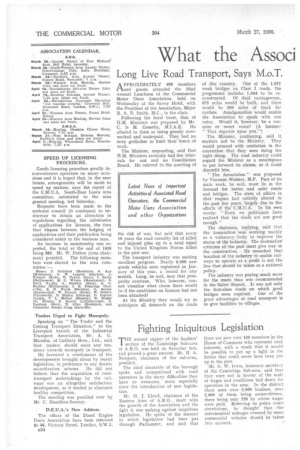Long Live Road Transport, Says • M.o.T.
Page 38

If you've noticed an error in this article please click here to report it so we can fix it.
APPROXIMATELY 500 members and guests attended the 32nd Annual Luncheon of the Commercial Motor Users Association, held on Wednesday at the Savoy Hotel, with the President of the Association, Major R. A. B. Smith, MC., in the chair.
Fallowing the loyal toast, that of H.M. Ministers was proposed by Mr. C. le M. Gosselin, M.I.A.E. He alluded to them as being grossly overworked and undenpaid. They had no fairy godfather to limit their hours of work.
The Minister, responding, said that H.M. Ministers certainly had few intervals for rest and no Conciliation Board. He referred to the averting of the risk of war, but said that every 10 years the road casualty list of killed and injured piles up to a total equal to the United Kingdom Forces killed in the past war.
The transport industry was making excellent progress. Nearly 8,000 new goods vehicles were registered in January of this year, a record for any month. Long, he said, may that prosperity continue. Who, however, cannot visualize what chaos there would be if the conditions on licences had not been attached?
At the Ministry they would try to anticipate all demands on the roads of this country. Out of the 1,071 weak bridges on Class I roads, the programme includes 1,044 to be reconstructed. Of dual carriageways, 875 miles would be built, and there would be 500 miles of track for cyclists. Amalgamation would enable the Association to speak with one voice. Would it, however, be a raucous or sweet voice? (A listener: " That depends upon you.") • The Minister, continuing, said it matters not to the Ministry. They would proceed with resolution in the conviction that they were doing the right thing. The road industry could regard the Minister as a mouthpiece to put forward its claims, or it could discredit him.
"The Association" was proposed by Viscount Wolmer, M.P. Part of its main work, he said, must lie in the demand for better and safer roads and bridges. The state of affairs in that respect had entirely altered in the past few years, largely due to the efforts of the C.M.U.A. In his own words: ",Even we politicians have realized that the roads are' not good enough."
The thairman, replying, said that the Association was working mainly as a voluntary body to improve the status of the industry. The destructive' criticism of the past must give way to the constructive. He remarked that taxation of the industry to enable railways to operate at a profit is not the line that should he taken as a national policy. The industry was paying much more for the roads thaa was recommended in the Salter Report. It was not only the first-class roads on which good bridges were required. One of the great advantages of road transport is to give facilities to villages.




























































































